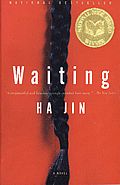 Back in the day–way back, say twelfth century back. Before the invention of the novel–poets in the courtly love tradition liked to compete over who could put their lovers in more difficult circumstances and draw out an affair. In one example, there was a wealthy landowner whose daughter was allowed to appear in public only at Sunday mass, and thiat under heavy chaperonage. At the communion rail, her lover sighed, “Alas.” The next week the maiden asked “For What?” The next week he answered “For Love.” And things went on from there for months and months before there was even a tryst, let alone a seduction.
Back in the day–way back, say twelfth century back. Before the invention of the novel–poets in the courtly love tradition liked to compete over who could put their lovers in more difficult circumstances and draw out an affair. In one example, there was a wealthy landowner whose daughter was allowed to appear in public only at Sunday mass, and thiat under heavy chaperonage. At the communion rail, her lover sighed, “Alas.” The next week the maiden asked “For What?” The next week he answered “For Love.” And things went on from there for months and months before there was even a tryst, let alone a seduction.
Well Ha Jin outstrips all those guys with his Waiting. The book was short-listed for the pulitzer, and I’d have been happier to see it win than The Goldfinch. even though I think it falls a step short of Pulitzer material. Nevertheless, Waiting is a remarkable novel.
You can read it almost as a study on how life in a totalitarian society creates depression and hopelessness. You can also read it as a love story so completely beyond anything in the modern western world that you have to struggle to join the situation. Here’s what I mean.

It’s the sixties. Lin enters into an arranged marriage in his mid-teens. His wife, Shuyuh, has strict, old-style parents who actually bound her feet, a fashion quite uncommon. Lin resents the coercion that forced him into the union, doesn’t love Shuyuh, is embarrassed by her awkward gait and homely looks, never appreciating the advantages the marriage brought to his family. There is a consummation and a subsequent daughter, but no sex after that.
Lin gets out of his little village and away to a Shanghai suburb as soon as he can. He becomes a doctor in the army. Apparently, everyone is connected with the army one way or another. He’s based in a compound where movement is restricted and opportunities for forming relationships fall considerably short of the odds on Match.com.
Nevertheless, he and nurse Manna Hu, fall in love. However, they have little or no opportunity for consummation, and are both so fearful of the consequences that they hold off… and hold off . . . and hold off. . . .
Lin sends Shuyu a monthly allowance and is granted leave to visit her annually. He agrees with Manna Hu to ask for a divorce. Such an act requires the approval of a village official, and the whole village sees Lin’s request as abandonment of his matrimonial obligations in general and of his wife and daughter in particular. Not to mention his interfering brother in law who stirs up the villages agains Lin. This whole ritual goes on for 18–that’s EIGHTEEN–years, which is the soonest a divorce can be granted without the wife’s approval. Shuyuh has agreed to the divorce every year, but each time withdrawn her consent in court under her brother’s influence.
But, finally, the divorce comes, and Manna Hu and Lin are married and have to come to terms with a relationship that has been suspended while they each grew in different ways, side by side, but never touching. Lin is incredibly passive and insecure, always second-guessing himself, finding it almost impossible to take the initiative in any difficult situation. He accepts his lot. Truth be told, he’s not such a lusty lad either, or he would have had more than one wet dream in thirty years and would have had a much harder time resisting physical contact with his one and only.
Manna Hu, pretty much realizes these character weaknesses early on, but in her late twenties, she’s already an old maid, is seen as attached to Lin even though they aren’t married or even engaged, so she’s trapped herself into unavailability by connecting with him. It’s worse than Hawthorne’s Salem. She doesn’t have to don the scarlet letter to be branded, and she doesn’t even get to have sex or a daughter to be condemned. So even though she’s much less diffident than Lin, she’s done for in the romance department before she even gets started.
Despite the difficulties of getting us to suspend our disbelief in this extreme circumstance, Jin pulls it off. We agonize for these two, partially because Jin takes inside their hearts and lets us see how weak and bewildered they are. Weak, anyhow, in relation to their circumstances. By the ambiguous ending, we’ve reached a life-affirming place in the tale, though subsequent events may prove that seeming affirmation false. But the possibility for happiness and even nobility of the human spirit in the worst of environments shines through.
